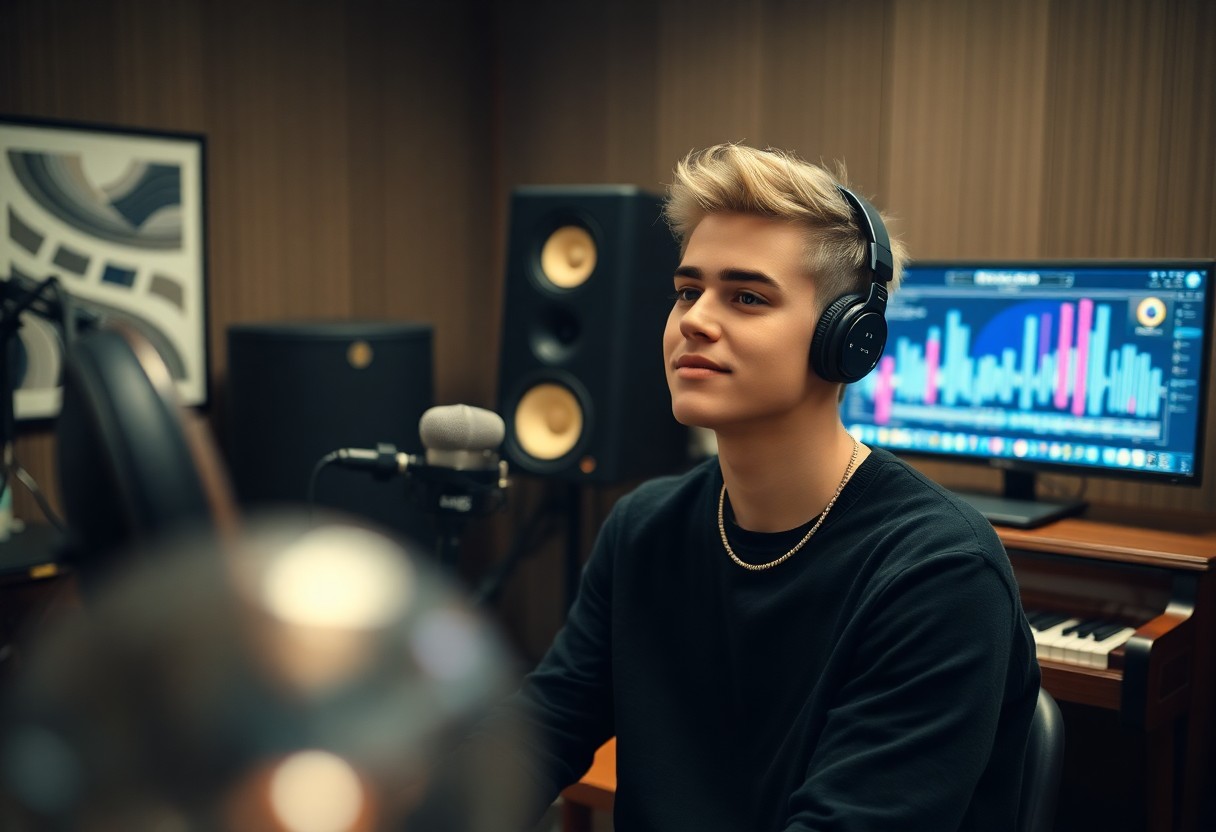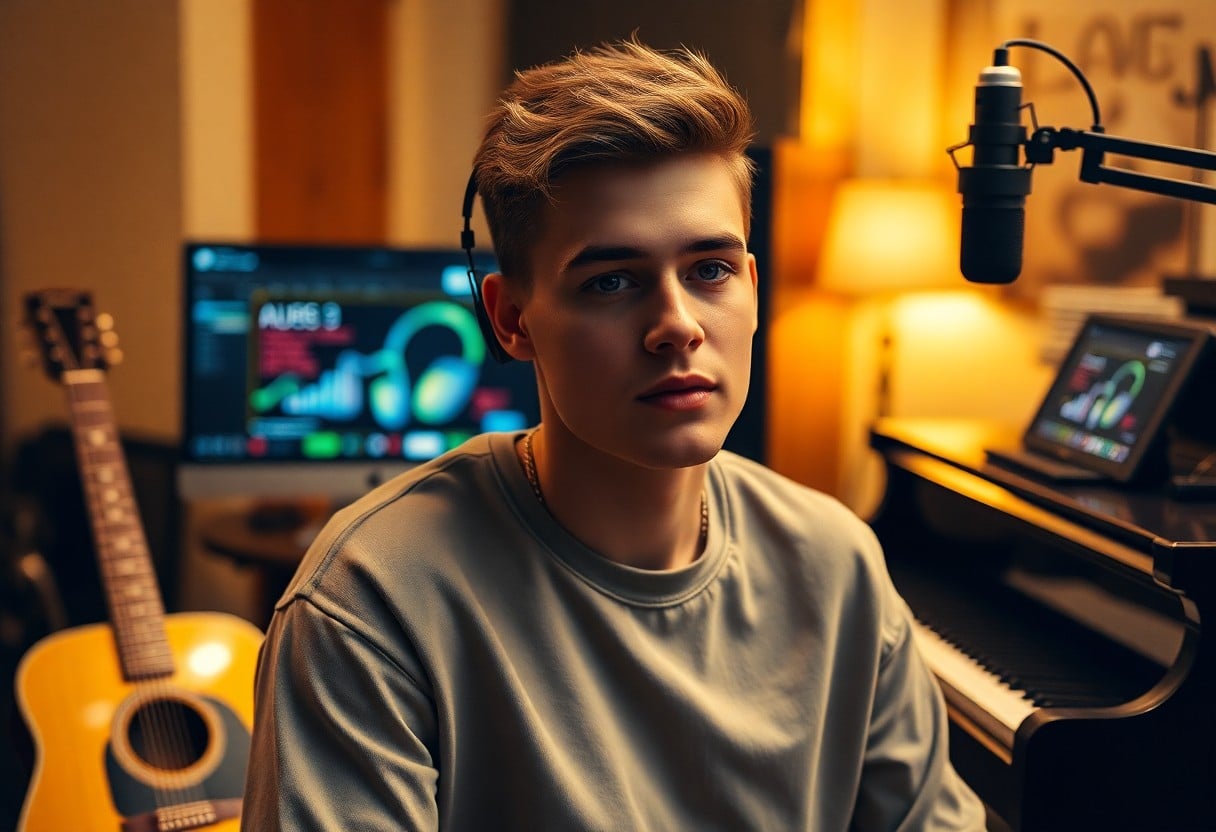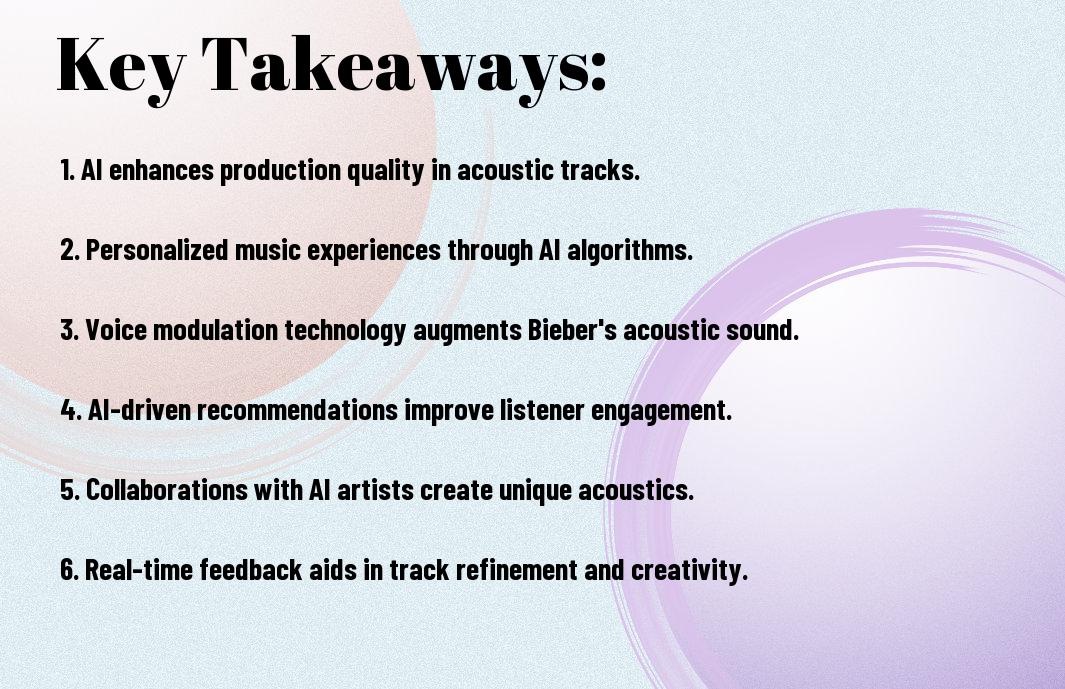Just when you thought Justin Bieber’s acoustic tracks couldn’t get any more captivating, artificial intelligence steps in to elevate the experience. In this post, I’ll explore how AI is reshaping the way we perceive and enjoy acoustic music, particularly in Bieber’s discography. You might be surprised at how technology enhances elements like voice modulation, instrumentals, and production quality, creating an immersive listening experience. Join me as I investigate into the intersection of AI and acoustic artistry in Justin Bieber’s music.
The Role of AI in Music Production
Before stepping into the intricacies of Justin Bieber’s acoustic tracks, it’s crucial to understand AI’s significant role in contemporary music production. AI technology has reshaped how music is created, enabling artists to experiment with sounds and streamline the production process like never before. As I explore how AI impacts these acoustic elements, it becomes clear that this technology not only aids in composition but also enhances the listening experience for fans today.
Enhancing Acoustic Sounds
One of the remarkable aspects of AI in music is its ability to enhance acoustic sounds. By analyzing various acoustic elements, AI can suggest optimization techniques that enrich sound quality, making every note resonate more profoundly. This precise manipulation allows artists like Justin Bieber to refine their acoustic tracks, ensuring a more immersive experience for listeners.
AI Tools Used in Production
One of the key drivers behind the integration of AI in music production is the innovative tools available to artists. These tools assist with everything from songwriting to mastering, allowing musicians to harness AI’s analytical power to create compelling acoustic renditions. With options like Amper Music and AIVA, I find that you can craft unique soundscapes tailored to personal and audience preferences.
Further exploring AI tools, I have noticed that they often employ machine learning algorithms to analyze vast amounts of music data. This analysis allows these tools to recommend chord progressions, melodies, and even specific sounds that can elevate a musical piece. As an artist or producer, you can leverage these insights to push the boundaries of creativity in Justin Bieber’s acoustic tracks. With AI’s assistance, I believe you can transform traditional music-making into a more dynamic and experimental process.
Justin Bieber’s Acoustic Tracks
Any music enthusiast knows that Justin Bieber’s acoustic tracks showcase a different side of his artistry. Stripped down to their essence, these renditions allow his vocal prowess to shine while providing an intimate listening experience. From heartfelt ballads to poignant interpretations, his acoustic versions present an opportunity to appreciate the emotional depth and nuance in his songwriting.
Overview of Notable Acoustic Works
Behind every acoustic performance, there’s a deliberate choice of instrumentation and arrangement that creates a unique atmosphere. Bieber has released several standout acoustic tracks, including “Sorry” and “Love Yourself.” These versions not only highlight his vocal range but also allow listeners to connect with the raw emotion behind the lyrics, feeling a more personal connection to the songs.
AI’s Influence on Track Arrangement
Tracks in the music industry have started to benefit from innovative AI technologies that streamline arrangement processes. With algorithmic suggestions for instrument combinations and vocal layering, AI-enabled tools help artists, including Bieber, explore new dimensions in their acoustic works. This integration offers a fresh perspective on familiar songs, inviting both the artist and the listener to experience the music in a novel way.
Consequently, the influence of AI does not simply stop at arrangement; it extends to enhancing the overall creative process. By analyzing patterns in successful acoustic tracks, AI provides insights that could lead to more compelling and emotionally resonant versions. This synergy between artist intuition and AI technology allows for a richer exploration of sound, helping you experience Justin Bieber’s acoustic tracks in an entirely new light.
Vocal Processing and AI
After exploring the intricacies of Justin Bieber’s acoustic tracks, I couldn’t help but notice how innovative vocal processing is reshaping the music landscape. In particular, tools like Justin Bieber AI Music Generator showcase the power of artificial intelligence in crafting unique vocal styles and textures. AI not only assists in fine-tuning vocals but also opens up a plethora of creative possibilities, enhancing the listener’s experience.
Voice Manipulation Techniques
Vocal processing employs various techniques such as pitch correction, reverb, and layering to achieve a polished sound. I find that these methods can transform raw vocal performances into captivating auditory experiences. Tools like Auto-Tune can help raise pitch accuracy, while reverb adds depth, making the overall presentation more immersive.
AI-Driven Vocal Enhancements
Behind the scenes, AI-driven vocal enhancements have significantly advanced the way artists produce music. These technologies enable you to experiment with different vocal effects and styles that were once time-consuming or challenging to implement. With AI, you gain access to tools that adapt to your unique vocal characteristics, enabling richer sonic explorations.
In fact, the integration of AI in vocal enhancements allows for a level of customization that you wouldn’t achieve with traditional methods. With machine learning algorithms analyzing vocal timbre and pitch, you can blend your unique sound with processed effects seamlessly. This means you can experiment with styles, create harmonies, or even mimic the sounds of popular artists with relative ease, providing you with a spacious canvas for your artistic expression.
Musical Composition and AI
All around us, artificial intelligence is increasingly playing a pivotal role in transforming musical composition. By analyzing patterns and drawing from enormous datasets, AI systems can generate melodies and harmonies that resonate with listeners. In Justin Bieber’s acoustic tracks, this technology can enrich the songwriting process, providing fresh ideas that push creative boundaries and producing music that feels both innovative and familiar.
AI’s Contribution to Songwriting
On various platforms, AI has emerged as a tool that complements human creativity in songwriting. By utilizing algorithms that can identify trends and emotional cues, AI helps artists like Justin Bieber explore new thematic concepts and musical structures, leading to a more diverse and appealing array of acoustic tracks.
Collaboration Between Artists and AI
Musical innovation flourishes through the collaboration between artists and AI, enhancing the creative process. AI serves as a co-writer, offering invaluable suggestions that an artist might not have considered, thereby making the songwriting journey more dynamic. This partnership allows artists like Justin Bieber to blend their personal touch with AI-generated ideas, resulting in a unique sound that appeals to a broad audience.
Consequently, as I navigate through this fascinating realm, I see how collaboration with AI has allowed artists to experiment boldly. They can blend genres, construct intricate arrangements, and produce compelling lyrics that may not have emerged on their own. This synergy not only enhances their creative output but also offers listeners a fresh perspective on familiar acoustic sounds, ultimately reshaping the music industry landscape.
Reception and Critique
Once again, the emergence of AI in Justin Bieber’s acoustic tracks has sparked varied reactions among listeners and critics alike. While many embrace the innovative fusion of technology and music, others express concerns regarding authenticity and emotional depth. In this landscape, it is necessary to navigate the complexities of this new sonic experience to truly understand its place in contemporary music.
Audience Reactions to AI in Music
One notable reaction from the audience has been a mix of excitement and skepticism. Fans appreciate the creative possibilities that AI brings, but some are wary of how it might affect the artistry of songwriters and musicians. This dynamic discourse reflects a broader conversation about the role of technology in our musical experiences.
Critical Analysis of AI’s Impact
Across the professional landscape, critics analyze AI’s impact on artists’ integrity and the essence of music itself. While some argue that AI enhances creativity by presenting new perspectives, others contend it risks homogenizing sound and diluting genuine human expression.
A deeper examination of AI’s impact reveals a dichotomy in how it is perceived. On one hand, AI serves as a powerful tool that allows artists to explore unique soundscapes and push creative boundaries. On the other hand, there’s a growing concern that reliance on technology might overshadow the emotional connection that comes from human musicianship. As I navigate this evolving terrain, I find it vital to consider how you, as a listener, experience the interplay between human artistry and technological advancement in music.
The Future of AI in Acoustic Music
Your acoustic music experience is set to evolve as AI continues to shape the industry. Innovations in AI technology are transforming how music is created, produced, and consumed, allowing for unique collaborations and new sounds. As we move forward, I anticipate an increasingly seamless integration of AI in acoustic tracks, enhancing artists’ creativity while providing listeners with personalized experiences that cater to their preferences.
Trends in AI Development
The rise of machine learning algorithms is enabling AI to analyze vast amounts of musical data, leading to advancements in music composition that closely mimic human creativity. By examining patterns in existing tracks, AI can produce new acoustic music that resonates with audiences while helping artists experiment with unfamiliar sounds and styles.
Predictions for the Music Industry
Across the music industry, AI will likely streamline production processes and democratize music creation, making it more accessible for emerging artists. This shift can lead to a surge of innovative acoustic tracks, as individuals without formal training can leverage AI tools to express their creativity.
Also, the personalization of music recommendations through AI will profoundly impact how listeners discover and engage with acoustic tracks. By analyzing listening habits and preferences, AI can craft customized playlists that resonate with your tastes, creating a more intimate connection between you and the music. This will foster a diverse ecosystem of acoustic music where both established and upcoming artists can thrive, resulting in a richer musical landscape for all.
Summing up
Conclusively, my exploration into the integration of AI in Justin Bieber’s acoustic tracks has revealed remarkable innovations in music production. I find it fascinating how AI can enhance sound quality and provide new arrangements while preserving Bieber’s unique artistry. As you listen to these transformative acoustic versions, I encourage you to appreciate the blending of human creativity with technological advancement. This synergy not only enriches the listening experience but also opens up exciting possibilities for future music collaborations.





No Comments